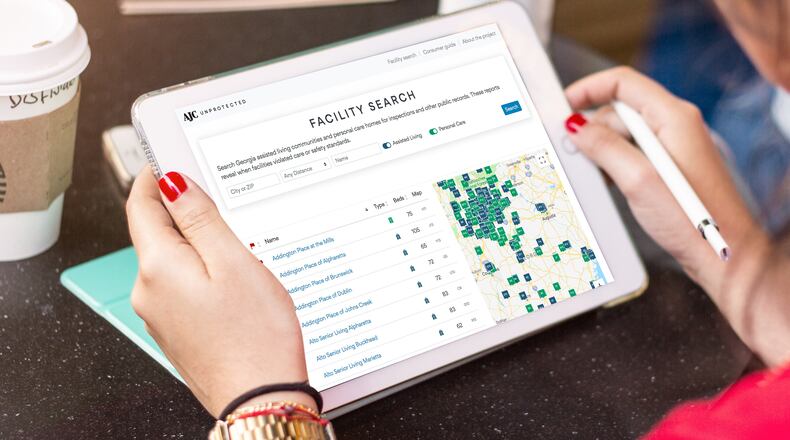We’ve gotten a lot of feedback on our “Unprotected” investigation that launched last Sunday. The project details the concerning state of some assisted living communities and personal care homes in Georgia. Sadly, a common refrain in the feedback is a sense of helplessness — a belief that it’s impossible to know if a community is safe, if the staff is up the job, if there is a pattern of problems.
Whether you are choosing a community for yourself or a loved one, reliable information is essential. And in Georgia, that information is all too scarce. This week we are launching a tool to help.
At ajc.com/unprotected, you will find a searchable database that includes robust information about assisted living communities and large personal care homes in Georgia, and a consumer guide from our investigative journalists who spent months studying the industry.
» SEARCHABLE DATABASE: Details on every home studied by the AJC
» MORE: The 'Unprotected' investigative series
The database includes more than 3,500 reports from the state Department of Community Health, which regulates these institutions. To help readers sort through what is important, our journalists reviewed and categorized each of them. On our searchable database, symbols and flags will help you identify homes with a pattern of serious problems, inspections that identified harm to a resident and homes where the same problem was detected more than once by inspectors.
DCH does not provide information in this form. What they do provide can be hard to find and understand. There’s no way to know where the home you are looking at fits in compared with other homes. If complaints aren’t proven — and many are hard to prove — you will never know about the complaint. Also, too often, information on particular communities is out of date.
It doesn’t have to be this way. As reporters Carrie Teegardin and Brad Schrade note in a story publishing tomorrow, many states do better.
» LISTEN BELOW: Carrie Teegardin discusses the "Unprotected" series on GPB's "On Second Thought"
“California and Oklahoma are among states that tell consumers what was alleged in complaints, even if the complaints ultimately are not substantiated,” Teegardin and Schrade write. “Florida maintains years of inspections on its website and offers a level of detail that far surpasses what Georgia provides. Ohio surveys facility residents and their families and shares the results online. North Carolina uses inspection information to rate homes using a star system.”
Our reporters tried to interview leaders at DCH about their commitment to transparency and providing information to families. Unfortunately, they would not agree to an interview.
Without an interview, I can only surmise: Our state must not see transparency as a tool to protect Georgians or give it much priority.
I find that sad.
» CONSUMER GUIDE: Resources for finding and evaluating a senior care facility
Our project aims to do more than add to transparency about individual communities. We also want to provide a broad picture of the industry and the state’s regulatory effectiveness.
The residents of assisted living and personal care homes are vulnerable. Often, when a business makes money by serving vulnerable citizens or an agency interacts with vulnerable citizens, government provides oversight in the form of regulation. Think of hospitals, day-care centers, even school bus manufacturers.
Public safety is typically the reason regulators watch industry and agencies. And the press, in a unique role endorsed by our country’s founding fathers in the First Amendment, watches the regulators.
For many health care institutions, the federal government is the regulator. Because they take lots of federal funds, nursing homes and hospitals face strict rules and detailed inspections.
Assisted living communities and personal care homes, however, are regulated by the states.
One of the things we find repeatedly as investigative journalists is that state regulators often won’t or can’t answer broad questions about how often the public is harmed by industries or agencies they regulate.
How many doctors have sexually assaulted patients? How many times have police shot suspects in the back and claimed it was because the suspect was attacking? How many times does understaffing lead to harm at Georgia’s assisted living homes?
The answers to these questions can tell us whether our institutions are working, how safe we are, how well government is protecting vulnerable citizens. But regulators are rarely set up to answer them.
Typically, records are collected and provided to the public in a way that relates only to one licensed professional or to one institution. Analysis across individual or institutional lines to answer broader questions is rare. In fact, agencies often tell us it’s not possible to get that kind of information from their records.
But of course, it is possible, if you collect all the records and do the analysis. It’s what we’ve done in “Unprotected.” We’ve looked across the senior care industry to determine how widespread the problems are, and their nature.
The findings are alarming, as you learned if you have read the installments published last week or on the front page of today's newspaper.
These findings wouldn’t be known without the work of The Atlanta Journal-Constitution. We consider it our duty to bring them to you. And as long as government leaves gaps in information our readers need, we’ll keep digging.
About the Author
More In This Series
How weather conditions set the stage for the deadly Texas flash floods
Shohei Ohtani works 2 scoreless innings and strikes out side in 2nd on 31st birthday
15 children are among the dead from Texas flash floods as rescuers search for the missing
Real Madrid beats Dortmund 3-2 after 3 stoppage-time goals, plays PSG in Club World Cup semifinals
